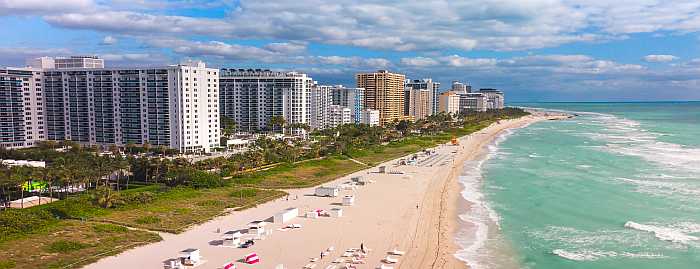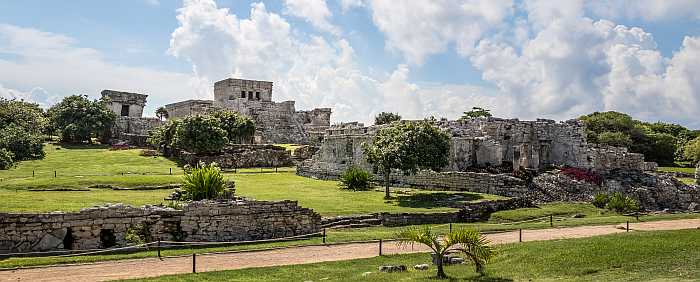
Passover programs in Miami Beach, Florida (Envato)
As soon as Purim ends, many people head straight for their Pesach kitchen to start cooking for Passover. Others wait until the last minute—but we’re not talking about them because, honestly, that’s just crazy.
For a growing number of families, though, preparing for Passover looks very different. Instead of scrubbing their house from top to bottom and cooking for days on end, they’re searching for the perfect Passover program—a stress-free Pesach vacation where everything is taken care of.
At Totally Jewish Travel, we’ve been covering the world of kosher travel and Passover programs for more than 25 years. Whether you're just getting started or you're a Pesach program regular, our goal is to help you find the right fit for your family.
At Totally Jewish Travel, we’ve been covering the world of kosher travel and Passover programs for more than 25 years. Whether you're just getting started or you're a Pesach program regular, our goal is to help you find the right fit for your family.
This two-part guide is for those families planning to spend Passover at a program, whether it’s their first time or they’re seasoned travelers. Part 1 covers the basics: What is a Passover program? How do they work? What should you expect? Part 2 (coming soon) will explore some of the most popular destinations for Pesach programs around the world.
When Is the Passover Holiday in 2026?
In 2026, Passover begins on Wednesday night, April 1st, with the first seder, and ends on Thursday night, April 9th.
In Israel, the holiday is observed for seven days, ending on the night of April 8th, while outside of Israel, Passover lasts for eight days. Not sure why there’s a difference? Here’s a more in-depth explanation of why Passover is seven days in Israel and eight days in the Diaspora.
If you want to see the full holiday calendar, including Passover dates through 2030, check out our When Is Passover? blog post.
What is a Passover Program?
A Passover program is a Pesach vacation package organized by a tour operator, who typically books out all or part of a hotel or resort for the entire holiday. Instead of making Passover at home—with all the cleaning, shopping, and cooking involved—families can celebrate together without the stress.
Preparing for Pesach at home is no small task. It involves scrubbing your house from top to bottom to remove chametz (any food with leavening), shopping for special kosher-for-Passover products, and planning eight days’ worth of meals. A Passover program takes care of all of that.
Most programs are all-inclusive. They provide three kosher-for-Passover meals a day, snacks, kids’ clubs, shiurim, daily minyanim, and evening entertainment. Some programs even offer day trips on Chol Hamoed, onsite spa services, or guest speakers and scholars in residence.
While many guests come from the U.S., Canada, Europe, or Israel, some programs also include group flights in their package, making travel easier.
Passover programs come in all shapes and sizes—from luxury beachfront resorts to more budget-friendly family hotels. Naturally, pricing reflects what’s included: the location, level of cuisine, accommodations, and extra activities all play a role.
For many families, it’s not just a vacation—it’s a way to truly enjoy the holiday, create meaningful memories, and take a break from the hard work that Pesach often brings at home.

Why do People go on Passover Programs?
Let’s be honest—making Passover at home is a lot of work. From kashering the kitchen to endless shopping and cooking, it’s no surprise that many families choose to go away for the holiday and let someone else handle the heavy lifting.
A Pesach program takes care of everything: the food, the cleaning, and the logistics. That alone is reason enough for many. But there are other benefits too.
Passover is often one of the few times a year when kids have a full week off from school, making it the perfect time for a family vacation. Many extended families use it as an opportunity for a reunion—sharing seders, reconnecting with siblings and cousins, and creating memories together.
For others, it’s about meeting new people and expanding their community. Passover programs draw guests from all over the world, so it’s a chance to socialize, network, and make new friends.
And of course, it’s a great way to see the world. With programs in destinations from the Caribbean to Europe to Asia, some families make it a tradition to explore a new country each year—without compromising on kashrut or Yom Tov observance.
How is the food at Passover Programs? Kashrut of Passover Programs? Gebrochts? Kitniyot?
Food is one of the highlights of any Passover program—and no one goes hungry. Most programs are all-inclusive and go well beyond the basics. You can expect three full meals a day, plus extras like poolside BBQs, 24-hour tea rooms, and snacks between meals. Some even have themed dinners or gourmet tasting nights.
To ensure top-notch quality, tour operators usually bring in their own chefs or work closely with the hotel’s culinary team. Many programs also feature well-known kosher caterers or celebrity chefs during the holiday.
When it comes to kashrut, there are programs for every level of observance. Most have a mashgiach (kosher supervisor) on-site for the entire duration of Pesach, and guests can usually speak directly with both the program operator and the kashrut supervisor to get specifics.
As for minhagim (customs), programs vary. Some serve gebrochts (matzah mixed with liquid), others are strictly non-gebrochts. Most programs do not serve kitniyot (legumes like rice and beans), but a few do—especially those catering to Sephardic guests.
Pesach food is always a big topic—everyone has their own traditions and expectations—so it’s worth doing your homework to make sure the program fits your family’s needs.

Passover programs provide meals (Envato)
What do people do at Passover Programs?
So much to say, so little space. Passover programs aren’t only about the food (just mostly about the food).
Beyond the meals, there’s a full schedule of activities for all ages. Programs typically offer daily minyanim, shiurim, and lectures for those who want a meaningful religious experience. Some even include options for continuing education, like CME and CLE credits—but make sure to check in advance if that’s something you need.
Children and teens usually have their own programming, ranging from day camps and arts and crafts to sports and evening activities. Adults can enjoy lectures, wellness classes, or just some well-earned downtime.
Evening entertainment during Chol Hamoed is a big draw. Many programs bring in well-known singers, comedians, and performers. Some of the high-end programs even compete to book celebrity talent or sought-after scholars-in-residence.
Because most programs take place at resort properties, you’ll often find swimming pools, spas, golf courses, water sports, beaches, and scenic surroundings. For those who want to explore the area, many programs offer optional day trips—some included, some at an extra cost—often with a boxed kosher-for-Pesach lunch (again, it always comes back to the food).
Whether you’re looking to relax, learn, be entertained, or explore, there’s usually something for everyone.
Wrapping It Up: What’s Next for Your Pesach Plans?
So, there you have it—Passover programs in a nutshell. We’ve covered the basics: what they are, what they include, and why so many families choose to travel for Pesach instead of staying home.
Ready to explore where you can go? Check out Part 2 of Passover Programs 101: Top Pesach Vacation Destinations for a look at popular and unique places to spend the holiday.
And if you’re already planning ahead, browse our Passover Programs 2026 listings to find your next destination.